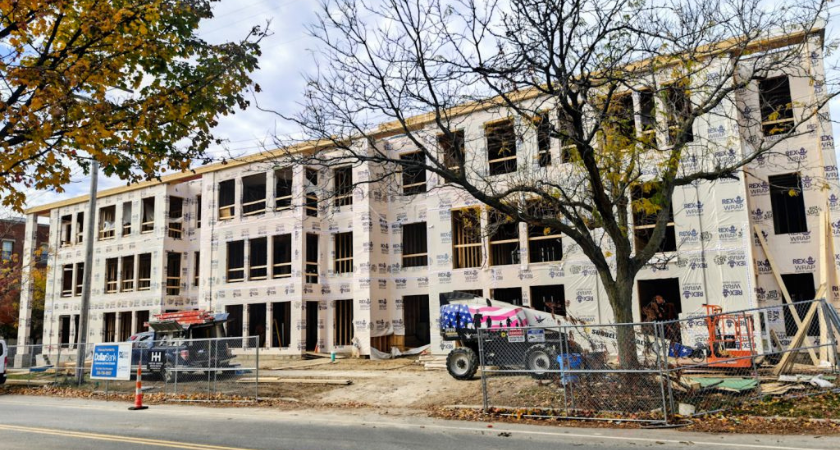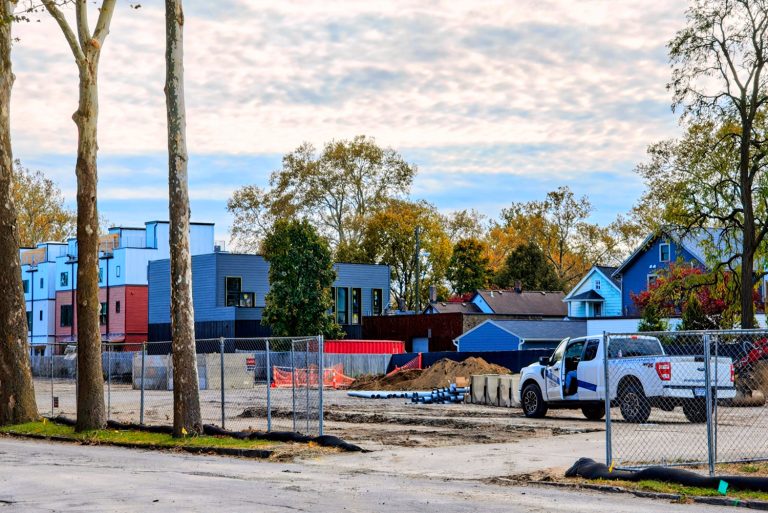
Ohio City continues to defy expectations about development slowdowns. Despite lingering concerns over rising construction expenses, shifting tariff policies, and revised city tax incentives, the Cleveland neighborhood is actively adding new housing — from restored historic buildings to modern apartment projects and infill homes.
Residents walking through areas near Franklin Avenue or West 25th Street will find construction cranes, renovation crews, and new framing climbing high above sidewalks. From large mixed-use renovations to small-scale homebuilding, Ohio City is experiencing one of its busiest development periods in recent years.

One of the most visible projects is Franklin Yard, where a 29-unit new-construction apartment building is rising at the corner of Franklin Avenue and West 32nd Street — a project that also includes the redevelopment of a Victorian-era mansion and a historic YWCA building into new housing options. When complete, the nearly block-long effort will deliver 57 additional homes while preserving treasured architecture.
Not far away, Carriage Co. is transforming the former Voss Industries site at 2168 W. 25th St. into 139 apartments with first-floor retail and indoor ground-level parking. The project will introduce activated walkways through previously disconnected industrial land, supporting a more pedestrian-friendly streetscape.
Across West 26th Street, site work has begun on Ambler Apartments, a 109-unit building led by developers Dan Whalen and Luke Palmisano in partnership with Geis Companies. Designed to help buffer risk from volatile tariffs and supply chain challenges, developers are aiming for a tight construction timeline.
Ambler intends to offer comfortable market-rate units with rents positioned slightly below Ohio City’s newest luxury offerings. The building design also creates a mix of new off-street parking supported by existing curbside spaces.
Franklin Yard exemplifies a broader trend in Ohio City: pairing adaptive reuse with selective ground-up construction. The historic mansion on the south side of Franklin will provide seven market-rate apartments, while the former YWCA building — previously operating as Vantage Place — is being updated with 31 new units, including energy-efficient windows and extensive interior improvements.
Across the street, the development’s 19-unit building recently reached its structural height milestone, signaling continued progress even as other cities see stalled projects.

For-sale housing is also on the rise. Gold Key Builders is developing five detached homes between Clinton Avenue and Vine Court following community-led design revisions. Several have already reached completion, with one of the final Clinton Avenue homes now close to finished.
Nearby, Berges Home Performance is finalizing the last of five infill homes at Monroe Avenue and West 30th Street — all delivered within a year to address demand for ownership-ready options.
These new builds replace vacant land that once weakened neighborhood cohesion, now restoring residential continuity and strengthening walkability.
Some projects focus more on modernization than unit expansion. At West 24th Street, The Condominiums at Stonebridge are undergoing a façade replacement to remove deteriorating materials and update the building’s look with sleek black and grey panels — a significant visual upgrade overlooking the Superior Viaduct.
Though questions remain about how long Cleveland’s urban housing surge can withstand pressures like tariffs and interest rates, Ohio City’s development market remains active and diverse. From historic renovations to large-scale apartment communities and strategic infill homes, hundreds of new residences are arriving — supporting continued population growth and reinvestment.
More photographic updates will follow as these projects evolve, with Progress Pics continuing coverage of the latest changes shaping Ohio City from the ground up.
Originally reported by Harrison Whittaker in Neo Trans.